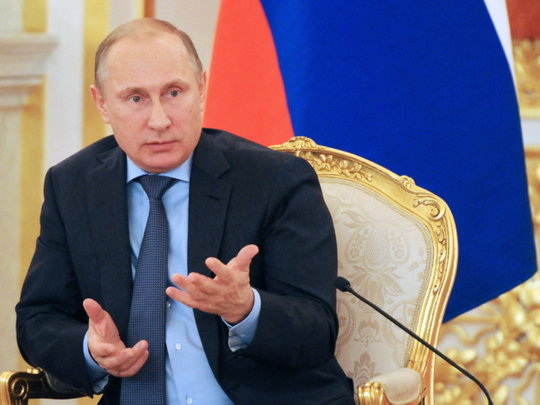
“Luck,” wrote the US gonzo-journalist Hunter S. Thompson, “is a very thin wire between survival and disaster, and not many people can keep their balance on it.”
Russian President Vladimir Putin, who Thursday gave the most pitiful state-of-the-nation speech of his extraordinarily lucky career, is falling off the wire.
The speech was a stark contrast to Putin’s regal performance on March 18, when he called on the Russian parliament to approve the annexation of Crimea. That day, Putin basked in the glory of the moment. Thursday, he came to the rostrum red-eyed and tired-looking: he had reportedly arrived at the Kremlin in the early hours of the morning, because of a bloody raid by Islamist militants in Chechnya. As Putin spoke, he stumbled over his words more than I’ve ever heard him do. It was the text he delivered, however, that testified to weakness in the normally macho Russian leader.
The speech appeared to have been written before the price of oil, on which Russia’s economic edifice has been built since Soviet times, started its downward spiral in the markets. Putin made no mention of oil at all. He rambled on about how important Crimea was to Russia and what he keeps calling a coup d’etat in Ukraine. He asked the audience to applaud the agricultural labourers who brought in a good harvest this year. He said everyone should work harder, be organised and responsible. And he quoted his favourite nationalist philosopher, Ivan Ilyin, on freedom — a good thing so long as it benefits the Russian nation. Oh, and he spent about 10 minutes talking about schools.
If anyone expected Putin to present a coherent survival plan for the Russian economy under low oil prices, they were disappointed. He said little to please the quasi-liberal economists who hinted recently he might adopt their proposals to focus on deregulation and anti-corruption. He did say businesses should be subject to fewer inspections by government agencies, and that the current tax regime should be frozen for the next four years, but these promises rang hollow. Putin has signed several laws to raise taxes on property and small businesses recently, including just three days ago.
When gloom prevails
Perhaps the biggest economic news in the speech was Putin’s offer of a tax amnesty for capital repatriated from offshore havens: “We all understand that the money may be of different origin, it could be earned or received by all kinds of means,” Putin said. “But I am convinced that we must finally turn the offshore page in the history of our economy and our country.”
That, too, sounded faintly ridiculous in view of record capital flight so far this year — to the tune of $85.2 billion (Dh312.93 billion), according to the Central Bank. Russian business shows no signs of wanting to “turn the offshore page,” quite the contrary.
As the president rambled on tiredly, a sour-looking audience of pro-Putin legislators clapped without enthusiasm and the rouble depreciated. Russia’s currency stood at 52.66 to the US dollar when the speech was due to begin, weakening to 53.60 as Putin launched into self-justification on Crimea and Ukraine. Then it strengthened a little, to 53.04, when he mustered a little steel in his voice, to say: “The authorities know who the speculators are, and there exist tools to influence them. The time has come to use these tools.”
It seemed for a moment that Putin could still inspire fear, if not belief — but no. The rouble soon resumed its slide, and at the time of this writing hovered above 53.70.
That shouldn’t be surprising: Putin’s only suggestion on how to manage the plunging national currency was a vague one to protect those on low incomes. At the same time he suggested the rouble’s slide should advantage domestic industries, as they step in to substitute for over-priced imports in the next three to five years.
That just gave listeners a gloomy sense that the weak currency policy was here to stay. To help industry rise to the challenge, Putin talked of forcing mammoth state-owned companies to source more of their purchases locally, and of recapitalising banks so they could issue more loans to enterprises. But with what?
Wednesday, Putin signed the Russian federal budget for the next three years, based on an oil price of $100 per barrel — well above the current level. Yet in his speech, he talked blithely of doubling investment in road construction. He is clearly in denial regarding the economic hurdles Russia faces if the oil price remains low in the medium term and his advisers appear unwilling to burst his bubble. After economy minister Alexei Ulyukayev predicted Russia’s gross domestic product would shrink by 0.8 per cent in 2015, and that real wages would drop by 3.8 per cent, Putin’s economics aide Andrei Belousov dismissed the forecast as “a bunch of numbers” and a “technical mistake.”
Putin doesn’t appear to have any kind of short-term or medium-term plan for Russia’s economy that’s compatible with the dual impacts of falling oil prices and sanctions. He has been so lucky throughout his career, as soaring commodity prices supported his self-aggrandisement, that he is at a loss now the trend has reversed. As Thompson went on to write in ‘Fear and Loathing in America:’ “people who count on luck don’t last long in the business of defusing bombs and disarming landmines.” Which is exactly what Russia’s leader is attempting to do today.
— Washington Post
Leonid Bershidsky is a Berlin-based contributor to Bloomberg View.








